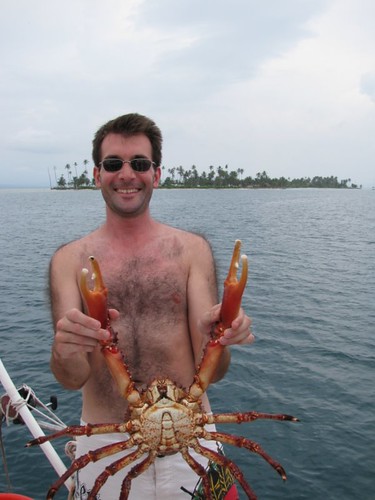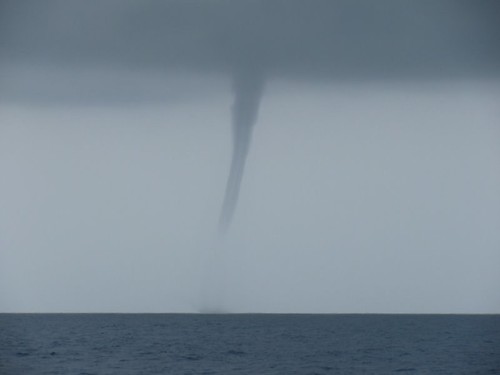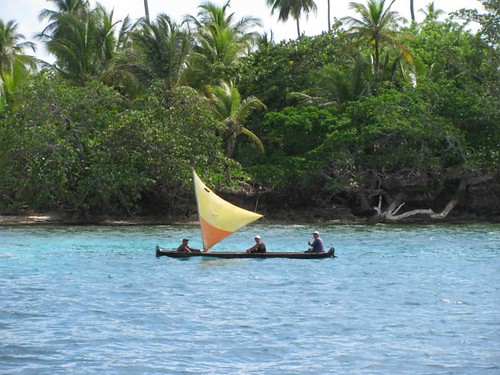We’ve just arrived in Cartagena, Colombia and in doing so have reached the South American continent. This blog post will include some review-like material which should prove useful to those who stumble upon it looking for opinions on Fritz’s boat & trip (the impatient can scroll down to the bottom).
I’ve long been a fan of the juxtaposition, and I doubt a more extreme contrast could be found than the first three days of our voyage versus the final 36 hours.
We began with some very smooth sailing between the islands that comprise the San Blas archipelago off the Caribbean coast of eastern Panama. We traded with the indigenous Kuna people to acquire enormous fresh crab and lobster, which was cooked up by the Austrian chef turned captain Fritz Breckner.
Days two and three throughout the islands offered us spectacular weather, clear waters, and snorkeling as good as – if not better than – what I experienced on the Great Barrier Reef. It was without doubt the hilight of our trip so far, lazing around on the deck, the catamaran’s trampolines, swimming, enjoying Nicaraguan rum and Colombian beer with good food. Truly perfect days.
Of course we were well aware that from late afternoon on day three, we would need to head out into the open ocean to continue onto Cartagena. Let me suggest that you don’t underestimate how rough the Caribbean sea can be.
I took seasickness preventative tablets (dramamine), and settled down onto the trampoline with some excellent tunes to enjoy the sunset. Noise canceling headphones came in handy to drown out the engine noise (lack of wind for sailing) and that of the 13 other passengers.
As the rocking of the boat slowly increased with the waves it seemed to me that the remainder of the trip would be a breeze. Great music, picturesque sunset, dolphins leaping out of the water in front of the boat – it was exquisite.
However the seas grew rougher, and the tablets less effective with each dose.
By dinnertime most of us were looking a little worse for wear; the pace of rum consumption had declined sharply. Shortly after people began disappearing to their berths, hoping in vain for some sleep to help hide from the ocean.
This, too, proved futile owing to both the enormous amount of movement of the boat, and the incredible noise transmitted through the hulls into the berths, conveniently located inside the hulls. It really sounded as though bombs were being set off underneath our bed! Also a factor was the stupefying humidity and lack of ventilation.
The next day continued in much the same vein, with the added excitement of storms and even multiple tornadoes. Imagine Fritz’s Austrian accent exclaiming “Fuck, I’ve never seen one of that so close before.”
During my night watch duty at around 2am on the last night I finally succumbed and threw up from the back of the boat a couple of times. I was surprised it hadn’t happened sooner.
Of course, we made it, and the high points of the trip did indeed make the low points worthwhile. I’d be hard pressed to endure the ocean segment again, though.
Notes for those considering the trip
From what we saw and learned from people who traveled on other boats, it does seem that Fritz’s is the best option. It’s one of the largest boats, is equipped with showers, quite a lot of space and the food is plentiful and – considering you’re on a boat – quite good. Fritz also seems to be very experienced and is eminently capable to deal with any and all situations. He’s an absolute cracker of a personality, and thoroughly enjoyable so long as you’re not easily offended.
Some downsides to note, though, are:
14 people (plus Fritz & Luz) on the boat is too many. It’s impossible for everyone to sit around the table for meals and three people’s beds were located in the saloon – although this did turn out to be the best (only?) place to sleep from a comfort perspective. Space constraints were always obvious, particularly during rain. Fritz was also carting a new oven/cooktop unit which took up a lot of valuable space and really got in the way.
The fresh water supply for 14 people is also seriously limited. Also consider that the boat stocks less than 10 properly functioning snorkels and masks. The latter could be easily fixed, of course.
Traveling east to Cartagena (as opposed to west to Panama) means, in general, rougher sailing and less wind to sail with, so more time on the engines.
In amongst the San Blas islands, you won’t really get an opportunity to run around that idyllic tropical island you always imagined. Sure, the islands are there, but many are inhabited by the Kuna people, and all the uninhabited coastlines are strewn with horrifying quantities of washed up litter. They look great in the photos, but every single one is covered with rubbish. The island paradise you imagine only exists if someone cleans up the trash.
In any case, the boat anchors away from the islands, and most of your time off the boat is in the water, rather than on islands.
Sleeping is tough, really tough. The cabins are seriously lacking in ventilation, even when you’re on the high seas in seemingly strong wind. The humidity is intense. If you suffer from seasickness (even a little) be prepared to feel absolutely rubbish for a couple of days.
I don’t know much about boats, but there’s a question mark over the reliability of various parts of Fritz the Cat. One of the engines, despite being less than a year old, cut out regularly and Fritz was unable to pinpoint the problem. The pump driving the fresh water system failed. He fixed it. There was a diesel leak, an engine oil leak, and a hydraulic fluid leak – alarmingly from the steering unit.
Fritz appeared to be capable of handling all of these situations, however it’s concerning just how much input he needed to have into so many aspects of the trip, including much of the food preparation. He definitely needs assistance from another deckhand, and is apparently in the process of organizing this. That, of course, will place further pressure on the passenger capacity.
All in all, I would recommend the trip with Fritz so long as you’re aware of these issues.
South from Central
The division between Central and South America seems somewhat arbitrary, given that there is a land bridge between the continents. Largely impassable, infested with tropical disease and criminals though it may be. But on arrival in Cartagena I had to admit the differences are striking, starting with simple things such as the choice of language used on the ubiquitous red STOP signs – PARE in the south vs ALTO in central. As we’ve seen in other countries on this continent last time round.
Colombia being a large, geographically diverse country of 45 million also explains much of the difference – providing the capacity to be much more self sufficient rather than relying on heavily tariffed trade with neighbors as seems the case in most of Central America. Lots more beef, too ;-)
Cartagena is a truly stunning city – well worth its UNESCO World Heritage Site status. We’ve been here a few days and will stay three more before flying down to Armenia & Salento in the heart of the coffee growing region for some chill out time and much cooler weather up in the mountains.
Tags: cartagena, colombia, fritz the cat, panama, rtw, sailing, san blas









Dear Sr., or Madam, I am planning on traveling to Panama from Cartagena by boat in the very near future, July 12-15 and was wondering if you offer such service. We are 4 adult peoples. Best Regards. Clara Beltran G. – Phone : 57-4-352-7100